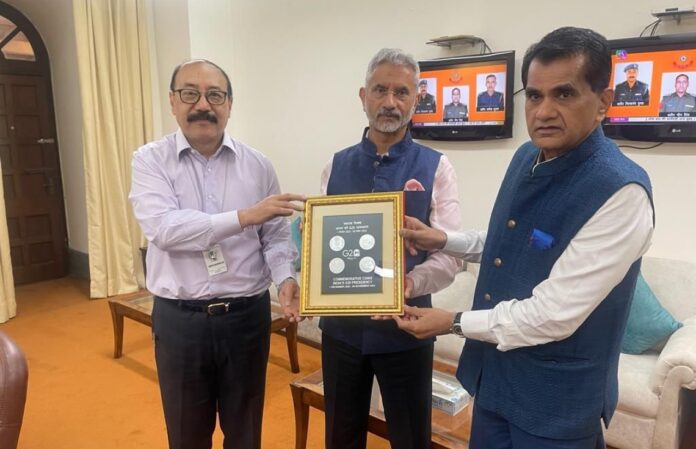Blending domestic and global
India’s inclusive approach followed under the G20 presidency is an extension of its existing domestic approach to development and progress, which specifically focuses on engaging all sections of society, particularly the weaker sections. Take digital public infrastructure, for instance. It has enabled the government to deliver the benefits of development directly to citizens in all parts of the country and has achieved this goal in a transparent, smooth, and corruption-free manner.
The theme of ‘Vasudaiva Kutumbakkam, One Earth One Family One Future’, is also significant. When we talk about ‘One Earth’, it reflects inclusivity and our approach to looking at the world in a holistic and comprehensive manner.
The Direct Benefit Transfer Scheme was implemented through Digital Public Infrastructure, along with the “Jan Dhan Aadhaar” trinity of identity cards, affordable internet telephony rates and “banking the un-bankable.” Through this scheme, 480 million previously “un-banked” Indian citizens now hold bank accounts and directly receive
government benefits from programmes such as the National Rural Landless Employment Guarantee scheme or the Pradhan Mantri Garib Kalyan package.
The Pradhan Mantri Jan Dhan Yojana benefits women immensely as 56 percent of the Jan-Dhan account holders are women with 67 percent of these accounts based in rural and semi- urban areas. This fact underlines the quintessentially inclusive character of India’s development programme. It is not surprising therefore that ‘women- led development’ is a major priority of India’s G20 presidency.
In a similar vein, the approach towards public health has also been inclusive and impactful. Through the COWIN platform, over 2 billion vaccines have been administered to our citizens. Additionally, the “Ayushman Bharat” scheme, the world’s largest publicly funded health insurance scheme, has touched the lives of over 500 million citizens.
Another crucial area of focus has been sanitation and availability of drinking water with more than 110 million sanitation facilities created across the country. In addition, about 110 million rural households out of 150 million have also been provided with access to drinking water at their homes. the ‘Har Ghar Jal’ initiative aims at ensuring that every household has access to water. these are just some examples of India’s commitment towards inclusive development which aims at involving all its citizens, especially those from the weaker sections of the society.
Global public good
The challenge of inclusivity lies in making sure that every single citizen in a country is provided with the basic necessities of life while ensuring that there is enough social security support for them, and India is consistently making huge strides in this aspect. Working for the global public good has been an important objective of India’s foreign policy as was evident during the COVID-19 pandemic. India shared medicines like hydroxychloroquine with over 190 countries in the world while also sharing the ‘Made in India’ vaccines with over 150 countries through the ‘Vaccine Maitri’ programme.
In the past decade or so, India’s development assistance quantum has doubled and lines of credit have expanded from USD 14 billion to almost USD 30 billion. Furthermore, within the Indo-Pacific region, India, along with some of its partners, is a first responder in extending humanitarian action and disaster relief.
At its core, India’s G20 presidency is a people-oriented event, through a ‘Jan Bhagidhari’ or people’s participation approach and because of it, there is a great amount of enthusiasm within the country for the G20.
Larger public participation at G20 related events, through seminars, conferences, quiz competitions, Model-G20 and festivals, facilitates their involvement as stakeholders in the G20 presidency process.
Global South
As Prime Minister Modi underlined in his remarks in February this year to G20 Finance Ministers and G20 Central Bank Governors, the G20 must focus on “discussions on the most vulnerable citizens of the world”. It was with this human- centric development mindset that he convened the Voice of Global South Summit, attended by heads of state, governments and ministers from 125 countries, soon after India took over the G-20 Presidency.
The democratization and reform of multilateral institutions has been a key theme of India’s international discourse in the past few years and so, India will aim to build consensus on all issues among G20 members to achieve definite outcomes during its presidency. the world order created after World War II has become archaic; it lacks the ability to solve the problems of the day and hence lost credibility in the eyes of the world. India thus emerges as a beacon of hope in these times.
As Prime Minister Modi has said, India stands ready and willing to help fellow developing countries in their development journeys in any way it can. India is happy to share its experience, know-how and best practices with the world, to take us all forward collectively, on our 2030 vision of Sustainable Development Goals and empower our people.
By firmly believing in inclusivity and taking everyone on board the path to growth and prosperity, India has shown what it means to lead by example. At a time when multiple crises of a global magnitude affect us all, the importance of keeping Vasudhaiva Kutumbakam’s sentiment alive has never been more critical.
Harsh Vardhan Shringla is the Chief Coordinator of India’s G20 Presidency. Prior to this, he was Foreign Secretary of India. In a four-decade long Indian Foreign Service career, he has been Ambassador to the United States of America, Bangladesh and Thailand. He was Consul General of India in Durban, South Africa and Ho Chi Minh City, Vietnam. He is also an experienced multilateral diplomat, having worked on two UN Security Council tenures, served in the Indian Mission to the UN in New York and as Permanent Representative to UNESCAP.




































